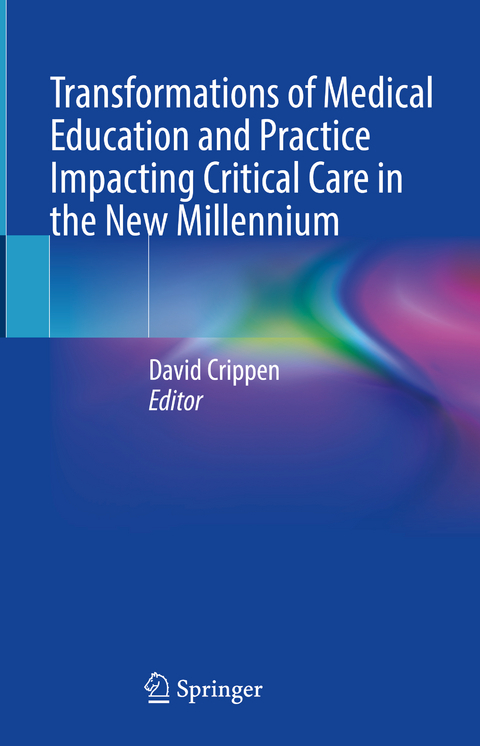
Transformations of Medical Education and Practice Impacting Critical Care in the New Millennium
Springer International Publishing (Verlag)
978-3-031-69685-5 (ISBN)
There have been major changes in the Education of critical care providers in recent years. Some of these changes involve the psychology of "Generation Z" applicants, new technological training aids, the issue of training disadvantaged trainees, exploring the difference between diversity and equity as well as the rise of physician extenders, physician assistants and registered nurse practitioners. Many of these changes have a direct effect on the quality and quantity of new physicians entering the work force in the new millennium. Accordingly, these Emerging Issues will have a direct impact on how critical care trainees are selected and trained, directly affecting patient care.
This Volume is structured To Illustrate three platforms, each resting on the platform below. The three main sections include medical education, Including The culture of medicine and critical care medicine in the new millennium. The first section includes Examinations of "Generation Z" and medical education, evolution of resident house staff, implications for onerous medical training costs, simulation models in medical education versus direct patient care, emerging providers in medical ethics and futuristic concepts for innovative medical education. The second section details politics, internet and social media use, the future of malpractice issues in health care, metabolic investigations at point-of-care, hope versus experience in long term ICU care and anti-vaxxers in the pandemic era. The final section details triage and ICU care of critically ill patients, algorithms that might replace clinical intuition, risks and benefits of artificial intelligence, music and the brain, ICU care during global pandemics, the rise of physician extenders, probability theory in interpreting clinical outcomes, new ideas in death by neurologic criteria as well as the future of death.
Written by experts in the field, Transformations of Medical Education and Practice Impacting Critical Care in the New Millennium serves as a detailed guide for seasoned clinicians working to teach the new generation of critical care physicians.
David W. Crippen, MD, FCCM is Professor Emeritus (RET) of Critical Care Medicine, Neurologic Surgery and Emergency Medicine at the University of Pittsburgh Medical Center in Pittsburgh, PA and former Co-Medical Director of the Neuro-Intensive Care Unit at Presbyterian University Hospital (retired, 2018) Dr. Crippen is a member of the Society for Critical Care Medicine, the European Society for Intensive Care Medicine, and the American College of Emergency Physicians until retirement. He is a Fellow of the American College of Critical Care Medicine and holds the European Diploma in Intensive Care Medicine. To date, Dr. Crippen has developed and delivered over 470 formal lectures on clinical topics in critical care and emergency medicine for National and International medical educational meetings.
In addition, Dr. Crippen has presented Multiple abstracts for medical meetings, manuscripts for peer-reviewed journals, popular media, critical care medicine textbook chapters and Four books as the primary editor. In 1993, Dr. Crippen discovered the newly emerging Internet, which at that time was limited to a few participants who understood the unix language. After gaining some experience with the Anesthesiology site Gasnet, Dr. Crippen developed and implemented an International clinical and academic resource for critical care providers. The site, CCM-L (Critical Care Medicine-List) offers multiple academic and clinical consultation services for a group of over 800 multinational participants.
Generation Z" in Medical Education: Not your Parent's Doctors Anymore.- Evolution of Resident House Staff in the Age of Libby Zion.- Implications of the cost of medical education.- Artificial Intelligence in Healthcare.- Futuristic concepts- innovative medical education.- The future of critical care medicine.- Simulation" in housestaff training.- Critical Care Physicians and Retirement.- Private equity and healthcare.- Medical Malpractice: personal notes and a prediction.- Consequences of "Anti-vaxxers" in a Pandemic Era.- Emergency responder teams" in hospital patient care.- Metabolic investigations at point-of-care.- Algorithms that might replace clinical intuition in critical care.- The emerging risk v. benefit of "artificial Intelligence.- Prognostication, code status, palliative care.- The rise of "physician extenders" in hospital patient care.- What is death & why is death.- Death by Neurologic Criteria.- The Biology of Life and Death.
| Erscheinungsdatum | 01.12.2024 |
|---|---|
| Zusatzinfo | XVII, 195 p. 22 illus., 16 illus. in color. |
| Verlagsort | Cham |
| Sprache | englisch |
| Maße | 155 x 235 mm |
| Themenwelt | Medizin / Pharmazie ► Medizinische Fachgebiete ► Intensivmedizin |
| Schlagworte | critical care • Generation Z • Internet • medical education • Social Media |
| ISBN-10 | 3-031-69685-9 / 3031696859 |
| ISBN-13 | 978-3-031-69685-5 / 9783031696855 |
| Zustand | Neuware |
| Informationen gemäß Produktsicherheitsverordnung (GPSR) | |
| Haben Sie eine Frage zum Produkt? |
aus dem Bereich


